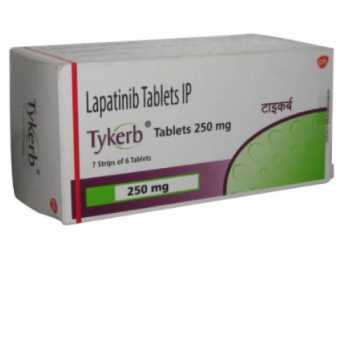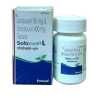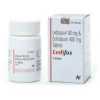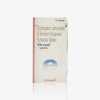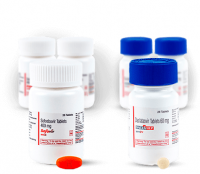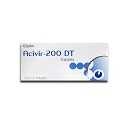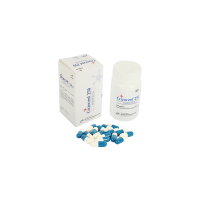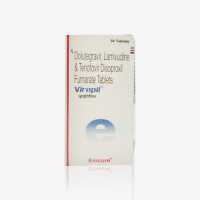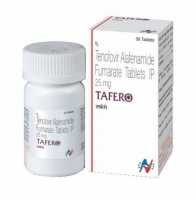Tykerb (Lapatinib 250mg)
Courier service EMS
Other transport services
Air India Post International
Payment in the bank on the invoice
WestrUnion
MoneyGram
TYKERB
DESCRIPTION
Tykerb consist of small molecule and a member of the 4-anilinoquinazoline class of kinase inhibitors. Tykerb tablets are classified as anti-neoplastic agent, which is orally active drug used for treating breast cancer. Tykerb tablets are comes under biological category which is targeted chemotherapy. These drugs work by ‘targeting’ essential proteins (receptors) which make cancer cells grow.
INDICATION OF TYKERB
- With combination of capecitabine is indicated for treatment of patients with advanced or metastatic breast cancer whose tumors overexpress HER2 and who have received prior therapy including an anthracycline, a taxane, and trastuzumab
- With combination of letrozole is indicated for treatment of postmenopausal women with hormone receptor-positive and HER2-positive breast cancer for whom hormonal therapy is indicated
MECHANISM OF TYKERB
Lapatinib belongs to a type of targeted cancer regimen (biological therapy) called a protein kinase inhibitor (TKI). It is a targeted therapy required for cancers which have large amounts of a protein called HER2 (human epidermal growth factor receptor 2).
Some breast cancers have large amounts of HER2. They are called HER2 positive cancers. HER2 which makes the tumor cells develop and divide. Lapatinib blocks HER2 to make the cells stop developing or die.
Absorption
The absorption of Tykerb is incomplete and insufficient, the maximum plasma concentration time of Lapatinib occurs relatively 4 hours after drug intake.
The steady state reaches within 6 to 7 days
Distribution
Lapatinib is highly bounds to human plasma protein like albumin & alpha glycoprotein nearly 99%.
Metabolism
Lapatinib is a substrate of P-gp & BCRP and go through intensive metabolism by using CYPP3A4 & CYP3A5 with lesser contribution of CYP2C19 & CYP2C8.
Excretion
Tykerb in single dose reaches half- life time in 14.2 hours and repeated dosing reaches in 24 hours. Elimination occurs via feces & urine.
DOSAGE REGIMENS AND ADMINISTRATION OF TYKERB
In HER2 positive advanced breast cancer:
The recommended dose of Tykerb is 1250mg should be administered orally as a single dose on day 1 to 21repeatedly combined with Capecitabine 2000mg/m2/day (should be taken orally in 2 doses relatively 12 hours apart) on day 1 to 14 in continuous 21-day cycle.
Totally 5 tablets of Tykerb should be taken at a time as whole.
In hormone receptor positive HER 2 positive advance breast cancer:
The prescribed dose is 1500mg should be administered orally as a single dose by combining with letrozole.
The prescribed dose of letrozole is 2.5mg as a once a day.
In these total 6 tablets of Tykerb should be administered as such.
Dose alteration:
Cardiac events:
In patients with reduction of left ventricular ejection fraction with grade 2, treatment with Tykerb should be discontinued. In this condition, the dose of Tykerb should be initiated with 1000mg/day in combination with Capecitabine; whereas in combination with letrozole the dose of Tykerb restated with 1250mg/day after 2 weeks, if LVEF turns to normal.
Hepatic impairment:
For patient with severe hepatic impairment, the dose reduced from 1250mg/day to 750mg/day or from 1500mg/day to 1000mg/day.
Diarrhea:
Tykerb tablets should be restarted once the severity of diarrhea may reduce to grade I. permanently discontinued if diarrhea is persisting.
Concurrent use of CYP3A4 inhibitors:
Tykerb should not be combined with CYP3A4 inhibitors; because of elevation of plasma concentration of Lapatinib occurs. For eradicate this effect, the dose of Tykerb should be reduced to 500mg/day.
Concurrent use of CYP3A4 inducers:
In this combinational study, the dose of Tykerb should be elevate from 1250mg/day to 4500mg/day or from 1500mg/day to 5500mg/day.
In other toxicity:
Postpone or stop the Tykerb therapy may happens, in case of developing higher grade of toxicities which is greater than or equal to grade II.
Tykerb use in combination with Capecitabine should be resume at lower doses 1000mg/day and whereas in combination with letrozole should be resume at lower dose of 1250mg/day.
Tykerb tablets should be taken without food; administer 1 hour earlier or 2 hours after the food uptake.
Capecitabine should be administered with food or taken within 30 minutes after ingestion of food.
TYKERB CAUSED SIDE EFFECTS
- Alopecia
- Pruritus
- Nail disorders
- Asthenia
- Headache
- Epistaxis
- Diarrhea
- Nausea
- Vomiting
- Stomatitis
- Back pain
- Dyspnea
- Insomnia
- Elevation of hemoglobulin, platelets, neutrophils
- Increase in AST & ALT, bilirubin
- Reduction of left ventricular ejection fraction
- Liver toxicity
- Interstitial lung disease
- Anaphylactic reactions
- Stevens Johnson syndrome
- Ventricular arrhythmias
- QT prolongation
DRUG- DRUG INTERACTION
- Midazolam concomitant use with Tykerb, will raise the exposure of Midazolam.
- Increase in paclitaxel exposure occurs while combination with Tykerb.
- Serum digoxin concentration should be checked periodically before starting the combination. If digoxin level in serum is greater than 1.2ng/ml, then the dose of digoxin reduced taken with half.
- Tykerb tablets are inhibition of CYP3A4, CYP2C8 & P-gp drug transporters; weak inhibitor of CYP3A4.
- The dose reduction of these concurrent uses of substrate drug should be advised, while allowing Tykerb combined with drugs metabolized by CYP3A4, CYP2C8 or P-gp.
- When interaction of Ketoconazole with Tykerb, the dose reduced to 200mg as two times a day for 7 days.
- Interaction of Carbamazepine with Tykerb, the dose of carbamazepine at 100mg as two times a day for 3 days & 200mg for two times a day for 17 days, the exposure of Tykerb reduced to 72%.
CONTRAINDICATIONS
A hypersensitivity reaction occurs in patients who are contraindicated to the component present in Tykerb tablet.
PRECAUTIONS
Diarrhea: Severe diarrhea may lead to dehydration causes death also; if patient do not recover from this severity must discontinue with this therapy.
Reduction in left ventricular ejection fraction: Caution should be taken while using Tykerb in patient with LVEF
The virulence of LVEF should be decreased within first 12 weeks of treatment
Before starting the therapy with Tykerb, patient must be examining thoroughly if suspected with LVEF or not.
Liver damage: Increasing level of AST, ALT or bilirubin may leads to liver injury
To prevent this condition, periodic LFT should be maintained
Interstitial lung disease: Patient should be monitored with pulmonary symptoms and provide supportive measures.
On severe condition, treatment should be interrupt or discontinue
QT prolongation: Monitor ECG periodically
Provide substituent for this adverse condition
Hypokalemia and hypomagnesemia correction should be takes place
PREGNANCY
Pregnancy category: D
Tykerb should not be used in pregnancy condition
The potency of Tykerb has not been evaluated in pediatric patients.
In both renal & hepatic impairment patients, caution should be taken while using this medication
LACTATION
Breastfeeding should not be allowed
STORAGE AND HANDLING
Tykerb carton should be kept at 25oC (77oF).
Keep the carton free from moisture, heat or light
MISSED DOSE
Missed dose should be skipped and follow the regular dosing schedule for avoiding adverse conditions. If missed dose occurs, it should not be resume and continue the next schedule.
- Trade name Tykerb
- Substance Lapatinib 250mg
- Manufacturer Glaxo smithkline
- Packaging 30 tablets
- Торговое наименование Tykerb
- Country of origin India
-
Convenient deliveryWe deliver to all countries of the World *. We cooperate only with trusted cargo carriers.
-
CONTROL AND INSPECTIONItem is checked before shipping! All the medicines are delivered directly from the manufacturer and sent from India to the client's address.
-
CHOOSE USWe provide the best price, including insurance against loss through the fault of the carrier. Our company cooperates directly with the largest manufacturers of medicines in India.
-
Promotions and DiscountsWe offer a flexible system of discounts for our customers and fixed discounts for current offers. Regular customers receive a discount of up to 10% of the amount of orders, as well as a remuneration system for referring customers via a referral link.
Запазете любимите си елементи към отметки
Това няма да загуби желаната опция!

